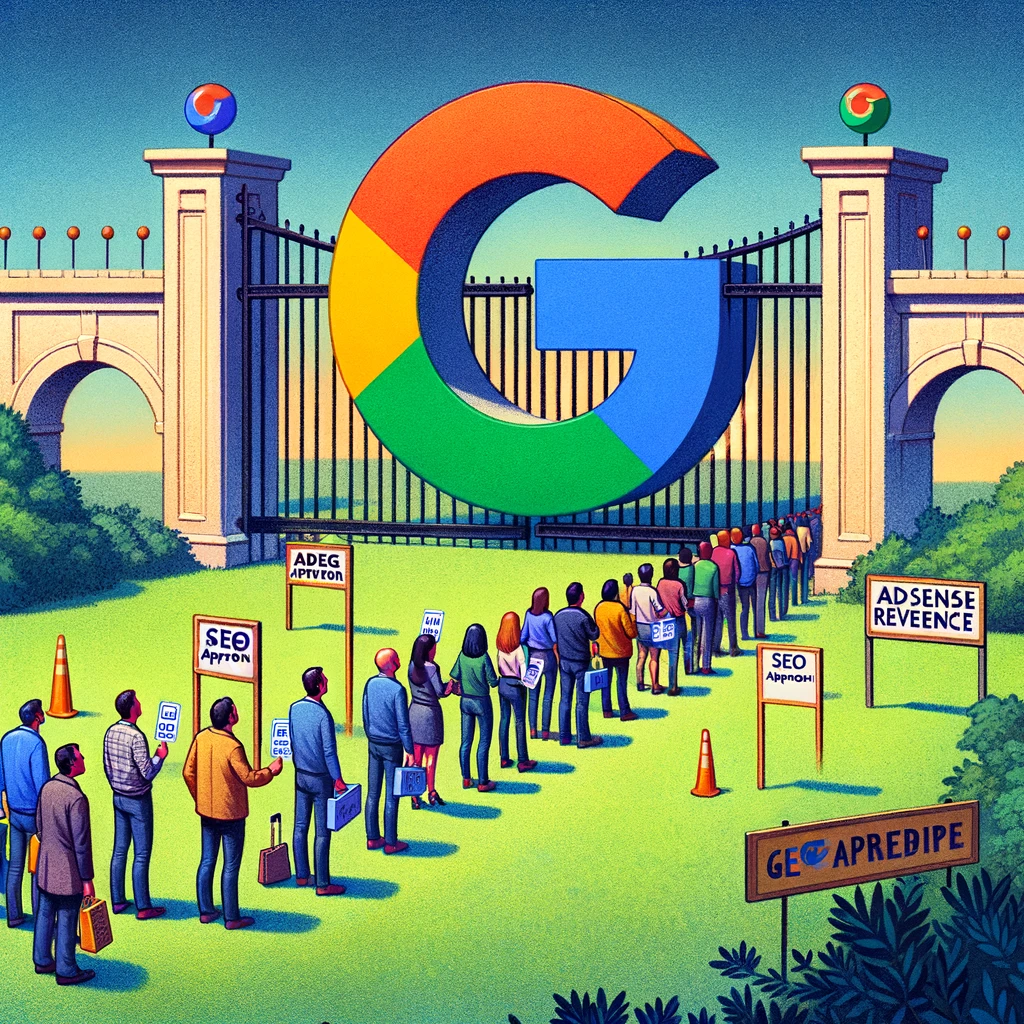Imagine Google as a playground where everyone used to have a fair chance to play and be seen. But it is not like these days.
People who write blogs, sell stuff as affiliates and try to get their businesses noticed online say Google is unfair. They think Google is using its power to help the big companies get even bigger while the little guys struggle to get noticed. Even regular users searching for stuff on Google might not get the best results because big companies are taking over.
Big Companies Are Dominating Google Search Results
The digital world got a bit of a shocker recently when Google rolled out weird changes to its system. It was like, “Surprise, surprise!” And let me tell you, people were scratching their heads, wondering what was up. However, after doing a lot of research, marketers discovered that lesser-known platforms have always been systematically marginalized as bigger ones are favoured.
A group of German researchers reports that search engine results are getting worse and more spammy, confirming a long-held belief that search engines are becoming unreliable. According to them, the situation worsens as AI becomes more powerful. “We can conclude that higher-ranked pages are on average more optimized more monetized with affiliate marketing; they show signs of lower text quality,” stated the researchers.

Collection and Analysis of Data
Google really went all out gathering information from blogs and marketers. It used sophisticated algorithms to analyze user data. All this was to make their search engine better. But here’s the kicker: it seems like they mainly cared about making big companies like Forbes, Reddit, and Quora happy. This left behind small firms that are, therefore, struggling with visibility within this space.
Impact On Small Scale Marketers And Bloggers
These updates have affected many websites, like RetroDodo.com or HouseFresh.com, most of which have experienced heavy traffic falloffs or decreased traffic. According to a report, Retro DoDo’s organic visibility has lowered to 85% in six months, and HouseFresh.com lost about 91% of traffic from Google.
Some of the evidence of discriminatory practices
1. Google Ads and Marketing: Smaller businesses depend on Google Ads for exposure, but the expense of advertising can be too high for competitive keywords dominated by bigger companies with larger marketing budgets.
2. Google My Business and Local Search: This program helps local businesses appear in search results for their area and on Google Maps. However, some argue that it doesn’t do enough to prevent spam or help small businesses stay visible if they aren’t actively engaging with the system.
3. YouTube and Content Creators: YouTube — owned by Google — has drawn criticism for changing its monetization policies and adjusting its algorithm in ways that can make it harder for small creators to make money while benefiting larger channels that already have a following.
4. E-commerce and Google Shopping: The search giant has been accused of showing favouritism toward its shopping service over competitors. In 2017, the European Commission fined Google a record $2.42 billion for abusing its dominant position by giving an illegal advantage to its comparison-shopping service.
5. Data Practices: Critics argue that Google collects a lot of information about its users from all its services. They use this data to improve their services and show ads to specific people. Smaller companies can’t do this, which some people think is unfair.
6. Google Discover: Lower-traffic publishers have noted that tweaks to Google Discover’s algorithm can lead to significant drops in readership. Discover usually shows articles from well-known websites, which makes it tough for newer or specialized sites to get noticed there.
The Fallout: Demise of Blogs and Affiliate Sites
Disappearance of Smaller Platforms
In the past, we have seen the internet was full of different voices and ideas. But now, there are fewer small blogs and affiliate sites around. Many had to shut down because they couldn’t keep up with the pace of things.
This imbalance indicates that big companies have more control over what shows up online. And we know that’s not fair. They’re playing a game where they make all the rules, leaving no space for newbies or small businesses to join in.
Efforts to Address These Challenges:
Searching for other avenues
Some smaller businesses are trying to find ways to deal with these challenges. They’re spreading out where they get their website visitors, like using social media, sending emails, or trying out other search engines. These places might give them a fairer chance.
Collaboration and community building have also emerged as essential tactics, with small creators and businesses supporting each other’s growth through cross-promotion and partnership.
Policy and Regulation:
Most of the attention in the biggest antitrust trial over twenty years has been about how Google’s power comes from deals with companies like Apple. These deals made Google the automatic search engine for phones and computers.
During the trial, proof came up that Google spends over $20 billion each year on these contracts. Lawyers from the Justice Department have argued that this massive amount of money shows just how crucial it is for Google to be the main search engine and prevent competitors from gaining ground.
Department of Justice also posted hundreds of slides at their closing arguments,
Thus, calls have been growing louder to take action against tech giants like Google’s monopolistic behaviour. Some ideas include ensuring antitrust laws are followed more strictly, encouraging open standards so different systems can work together, and being transparent about how algorithms decide what to show users. The goal is to make the online world fairer and more diverse and to encourage new ideas instead of letting a few companies control everything.
Lack of Acknowledgement from Google
With all these big changes happening, Google has been surprisingly silent. They haven’t said anything about whether they’ve changed how their system works or given any help to the people who are most impacted by it.
- Google’s Duty To Its Users: Since Google is such a big deal in the tech world, it has to make sure it plays fair with everyone—both the folks who own part of the company and the rest of society.
- Creating Equal Opportunities: Doing business ethically means making sure everyone has a fair shot at success, no matter how big or small they are. But lately, Google’s actions have made some people wonder if they’re sticking to that principle.
How do we deal with this situation?
- What Marketers and Blogs Can Do: To deal with this new situation that Google has put us in, marketers must start looking at other places to get people to visit their websites. That means paying attention to places like Bing, not just Google. They also need to ensure their content is engaging and interactive so people want to check it out.
- For Affiliate Sites and Informative Blogs: Affiliate websites should start selling things online so they don’t have to depend too much on getting visitors from search engines. As you never know when that traffic might suddenly disappear. Regulators, competitors, and regular people like you and me should ask Google to be more open about how they do things. This would make digital markets fairer for everyone, no matter if they’re big companies or small businesses just starting out.
User Recommendations
What you do and choose online can really make a difference in how the market works. So, consumers like us need to explore different sources of information online and be picky about what we engage with. This helps create a fair and diverse marketplace where everyone has a chance to succeed. These include:
- Trying Out Other Platforms: Instead of always using dominant search engines like Google, why not try alternative platforms whose search algorithms and results may be different – maybe even fairer? This will give multiple sources of information and boost smaller businesses within the industry.
- Supporting Independent Creators: By supporting creators directly, like small businesses, by buying their stuff or sharing their work on social media, we can help them out a lot. This means they don’t have to depend so much on search engines to get people to visit their websites or make money. It’s like giving them a boost and showing them some love!
- Consuming Content Responsibly: How much people interact with content, like how long they spend on a page or how many times they share or comment on it, affects how visible that content is. So, users need to get involved with different content sources. This helps ensure that the best stuff gets seen and shows big tech companies that we’re paying attention to their actions.
- Using Ad Blockers and Privacy Tools: Blocking ads or using privacy tools may not make a big difference in how companies compete. But it helps make the online world safer and more private. And that’s good news for smaller businesses that don’t use tricky tactics to get ahead. So, by protecting our privacy, we’re also helping out the little guys.
- Getting Involved in Public Discussions: Joining discussions about ethics in technology, antitrust laws for online businesses, and other related topics helps us all discuss the big issues. When we speak up, we tell lawmakers and regulators what we think is important. That can push them to make rules that help keep things fair for everyone. So, by sharing our thoughts, we’re helping shape the rules that govern the online world.
- Educate Yourself and Others: Understanding how search algorithms work, why monopolies are a problem online, and why being digitally literate can give us the knowledge to make smart choices online. It’s like having a map to navigate the online world so we can make intentional decisions about what we do and where we go.

